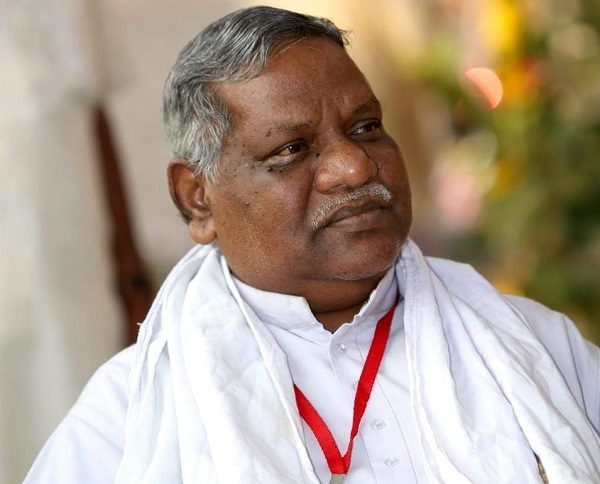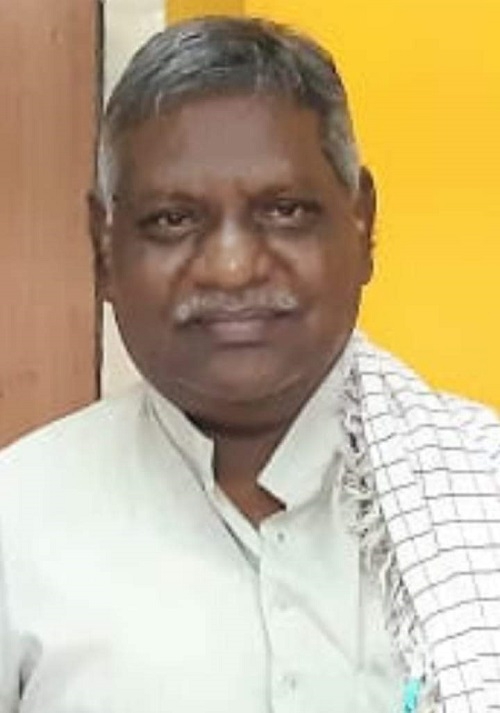Remembering Revered Jagdev Ram Uroan Jee on his First Death Anniversary
Total Views | 411
Revered Jagdev Ram Uroan Jee left for heavenly abode exactly a year ago on 15 July 2020 at Akhil Bhartiya Vanvasi Kalyan Ahram’s (ABVKA) National Office at Jashpur, his workplace at least for a half century. While we remember him on his first death anniversary, it’s very important for us as a nation to remember his journey and legacy. He remained National President of ABVKA for twenty five years after inheriting the mantle from his master revered Vanvyogi Balasaheb Deshpande Jee. He truly lived up to the trust and confidence with which the baton was passed on to him by his master. Though he belonged to a poor janjati family in Komdo village in Jashpur Nagar district of today’s Chhattisgarh state, he did not confine himself to the worries of hearth and home. He remained unmarried and dedicated all his life for the cause of janjati community of Bharat.
Jagdev Ram Uroan Jee was born on 8 October 1949 to Aghnu Ram and Buchhubai. He was the eldest of four daughters and three sons of his parents. He started attending RSS Shakhas, the morning and evening gatherings of swayansevaks (volunteers) at his early age. He did his Master of Arts (M.A.) and acquired a degree in Physical Education. Having come from janjati community himself, it was quite easy for him to get a government job in those days and start a normal family life but he chose to live the life of a hermit.

The far-flung and inaccessible areas of today’s Chhattisgarh and Jharkhand primarily inhabited by janjati community had remained much underdeveloped. Poverty, illiteracy due to lack of schools and immense scarcity of health facilities were all pervasive in the region. The situation was rendered a fertile ground for evangelical missions who were fervently carrying on with their activities of converting janjatis into Christian fold taking advantage of their poverty and innocence. It was in this backdrop that Pt. Ravi Shankar Shukla, the then Chief Minister of Central Provinces (today’s Madhya Pradesh and Chhattisgarh) visited the region in the late 1940s. In this visit, he was welcomed everywhere but was shown black flags and asked to go back when he reached Jashpur. His experiences in this visit exposed him to unimaginable backwardness and massive conversion so prevalent among people. This made him think to assuage sufferings and anguish of people by coordinating with revered Thakkar Bappa, a well known Gandhian who had extensively worked in the janjati areas. Very soon social welfare department was established and Balasaheb Deshpande Jee joined the same in 1948. After Thakkar Bappa’s death in January 1951, he found it difficult to carry on with janjati development activities due to administrative pulls and pressures. This made him think that there was a need to carry on with his developmental projects for janjati communities in the area independently leading to the establishment of Vanvasi Kalyan Ahram on 26 December 1952.
ALSO READ- Federal Church of India raided in Kanyakumari; 7 people, including 4 women & Pastor Lal NS Shine Singh arrested for running sex racket
In 1977 at Surat Meet of Vanvasi Kalyan Ashram, Babasaheb Deshpande Jee decided to expand the organization's activities all over Bharat. Thus Vanvasi Kalyan Ashram became Akhil Bhartiy Vanvasi Kalyan Ashram. Since then Shri Jagdev Ram Jee started travelling with his mentor. In 1985, he was made the member of ABVKA's National Committee and further in 1987 Vice- President, Babasaheb being the President. Two years before passing away in 1995, Balasaheb nominated Jagdev Ram Jee as the National Working President of ABVKA at its Cuttack National Convention in 1993. The relationship between Balasaheb and Jagdev Ram Jee is embodied in the Guru-Shishya tradition of Bharat like that of Swami Ramkrishna Paramhans and Swami Vivekananda.
Since the time Jagdev Ram ji became president of ABVKA, he played an important role in developing the plant of Vanvasi Kalyan Ashram sown by his master Balasaheb into a banyan tree. At present ABVKA is the largest organization in Bharat working for the overall development of janjatis that covers aspects such as education, health, sports, village development, skill development, youth development, women empowerment, self help groups, protecting janjati constitutional rights and so on all over Bharat. The organization that was started with its first project having only 13 janjati children enrolled to be educated with hostel facilities today has 20,000 projects in 323 districts with footprints in more than 52,000 villages. His life was one of devoted to the cause of janjatis of Bharat and he lived to see that happen. He was staunch believer that the janjatis are very much integral part of Bharat’s socio-cultural fabric from time immemorial. Therefore, he travelled tirelessly from north to south and east to west invoking the thought that we all are one and our destinies are intrinsically interwoven. His contributions in the successful organization of Shabri Kumbh in the Dang District of Gujrat in 2006 in which hundreds and thousands of janjatis from all over Bharat participated are immense. Similarly, he exuberantly participated along with the ocean of janjati people from all over the country in Ardha Kumbh Mela at Ujjain and Mahakumbh Mela at Prayag.

Jagdev Ram Jee was equally concerned about reinvigorating cultural heritage of janjatis. For example; he started Rohtas fort pilgrimage located in the Son River Valley, in the small town of Rohtas in Bihar. The Oraon janjati owes their origin to this fort and surroundings. People from Assam, Chhattisgarh, Jharkhand, Madhya Pradesh, Uttar Pradesh, Maharashtra, Bengal etc. are participating in this pilgrimage for many years now. It was in his leadership that ABVKA made rapid strides and became more vocal in the public discourse by bringing in ‘Vision Document’ for socio-economic-cultural development in 2015. He was very crucial in bringing the final draft of the document in consultation with activists, policy makers and academician from across the country. He remained at the fore front in bringing various issues with regard to various issues of janjati community to the notice of constitutional authorities and policy makers and insisted on their timely resolution.
Despite being such a man of stature, his demeanor was that of simplicity, care, affection and compassion towards everyone he met. It’s because of these traits of his personality, he could easily connect with thousands karykartas, men, women and children alike. He certainly is the strongest pillar of ABVKA that has grown leaps and bounds in every nook and corner of the country. He lived and dedicated all his life for the cause of janjatis but his legacy is not confined to a particular community. Moreover, thoughts and deeds of great men must not be kept limited to a particular segment of society. The impact of their life’s work is pan national, across all communities. Therefore, their legacy must be re-invoked and presented to this and coming generations so that we learn to trade the path that men like Jagdev Ram Jee have created for us to follow.
.
.





